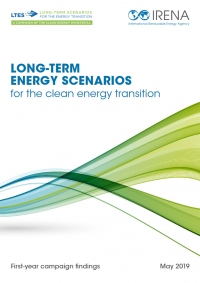IRENA: Long-term energy scenarios: First-year campaign findings - May 2019 - eng (pdf)
The clean energy transition presents an unprecedented challenge for decision makers. Low-cost renewables, a smarter and more flexible power grid, and greater numbers of vehicles and other systems running on electricity require a forward-looking approach to energy planning.
Long-term energy scenarios (LTES) can trigger productive policy debates and help to shape long-term visions for the energy future. By exploring socio-technical pathways over c. 20+ years, planning rooted in LTES helps governments to prepare in advance for key interventions, to recognise shorter-term challenges and opportunities, and make well-informed investment decisions.
A collaborative campaign, launched at the 9th Clean Energy Ministerial (CEM) in May 2018 and co-ordinated by the International Renewable Energy Agency (IRENA), calls for wider adoption and improved use of model-based LTES. This brochure highlights findings from the first-year of the LTES campaign.
LTES campaign themes:
- STRENGTHENING DEVELOPMENT
- IMPROVING USE
- BUILDING CAPACITY
Focusing on CEM countries, the campaign explores ways to strengthen scenario development, improve the use of scenarios in strategic decision-making, and build the institutional capacity for scenario planning.
Digitalisation, decentralisation and electrification have all started to change consumer behaviour and create new business models. At the same time, countries face the urgent need to decarbonise energy use to meet the climate goals set out in the Paris Agreement. Long-term planning, consequently, must grapple with unprecedented technology, market and policy uncertainties.
Energy modelling tools, which quantify the implications of different technology choices and help to highlight crucial interdependencies, are a vital component of LTES development. At the same time, stakeholder consultations at multiple levels can enrich the qualitative side of scenarios for the future.
Дополнительная информация
- Серия: Международные организации / IRENA
- Год: 2019
- Месяц: 5
- Источник: IRENA - International Renewable Energy Agency


































